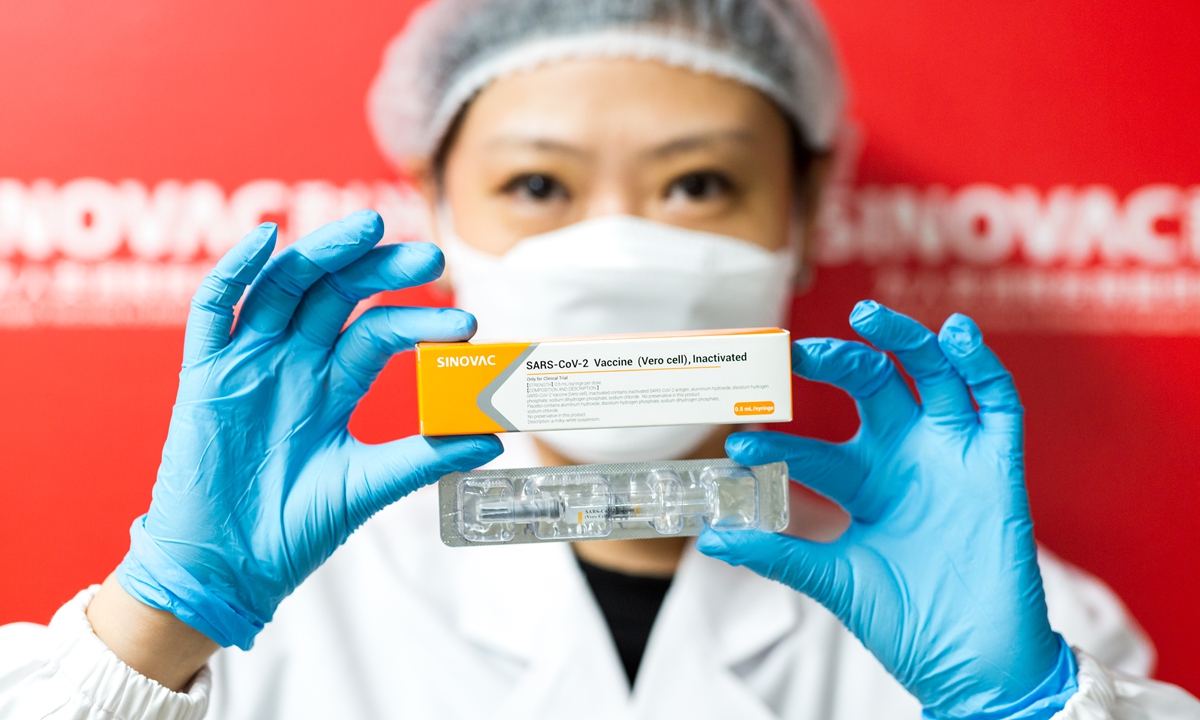Chinese-developed COVID19 vaccine CoronaVac heard progress in Turkey seeing more than 600 volunteers injected with no serious adverse reactions
By Hu Yuwei and Lin Xiaoyi Source: Global Times Published: 2020/11/18 22:33:47

Inactivated COVID-19 vaccine CoronaVac produced by Chinese vaccine developer Sinovac Photo: Courtesy of Sinovac
Chinese-developed COVID19 vaccine CoronaVac has made progress in its late-stage clinical trials in Turkey as there have been 1,111vaccinations in 638 volunteers - all healthcare workers - across local 25 medical centers as of November 16, the trials study coordinator Professor Murat Akova of the Infectious Diseases department at Hacettepe University, where the clinical tests were launched on September 17, told the Global Times on Wednesday.
Turkey's research team confirmed the safety of Chinese-developed vaccine after the clinical trials on the CoronaVac were temporarily suspended in Brazil on Monday due to a supposed "adverse event" which later proved to be a suicide case unrelated to the vaccine.
Some 150 volunteers - unknown if they got vaccine or placebo - underwent 331 adverse reactions, but none of these adverse reactions were severe, said Akova, saying that 8.49 percent of main reactions were local reactions (e.g. pain at the injection site) and 11.58 percent of systemic reactions included fever, headache, and tiredness.
Akova told the Global Times that the vaccine candidate is safe without unexpected side effects so far based on their observations but they are not yet convinced about its efficacy.
"The main advantage at this stage [of CoronaVac] is related with logistics; i.e. it can be kept in fridge at 4 C as opposed to -70 C for Pfizer vaccine," said Akova.
The Turkish team informed the Ethics Committee and suspended the trials upon hearing about the temporary suspension of trials in Brazil, but resumed soon after learning about the death of the participant was not related with the vaccination.
"For efficacy analysis (i.e. whether the vaccine is effective to prevent COVID-19), we have to identify 40 volunteers developing COVID-19 [from all participants who have been taking doses]. Then, the independent safety board will look at the data and see whether these patients had vaccine or placebo, in order to calculate vaccine production rate," said Professor Akova.
The local department requested the vaccine candidate to be at least 60 percent efficient as protocol set. The trials research team and its Ethics Committee decided to make an interim analysis when they found 20 COVID-19 patents among the volunteers. They have now found out five volunteers developed COVID-19 after 14 days of the second dose (i.e. 28 days after the first vaccine), according to the research team.
The clinical researchers now have exceeded 600 volunteers and they plan to extend their volunteers pool to the general public. And the team would take 2:1 randomization, which means giving a real vaccine for every two volunteers and a placebo for another volunteer. "In that way, more people will have the chance of having a real vaccine. Then we shall wait to see 20-40 patients with COVID-19 developing among the vaccines."
They largely rely on data from Brazil, China and Indonesia to help enhance their analysis. The team expects to reach their interim analysis by January 2021. "But depending on the number of volunteers from the general public, it may be even earlier," said Akova.
Global Times
Posted in: SOCIETY